#fun with kanji
Text
Gwyndolin’s Names
[Obligatory disclaimer: I’m referring to Gwyndolin as ‘he’ throughout. I won’t judge you for doing as you prefer.]
Dark Sun Gwyndolin hides secrets, and even his name is no exception. Continuing the theme of Welsh names, he combines the elements “Gwyn” (fair or blessed) and “dolen” (ring, bow, hair, or brow). The interpretations “fair bow, blessed ring, white ring, who has white eyelashes'' are all applicable to Gwyndolin - evoked by the bow he wields in combat, the silver ring given to the Darkmoon Blades, and the pale brow and white hair of the Dark Sun.
The symbolism doesn't end there.
In Japanese, Gwyndolin’s title is 陰の太陽, “Sun in Shadow,'' an interesting phrase. On a surface level, “Dark Sun” nicely captures the imagery and inherent duality of the description, however, the English translation has lost a number of interesting details.
陰 does mean dark or shadowed, but it has multiple connotations.
Notably, 陰 “Shadow” is not the same as 闇, used throughout the game for the Dark. Likewise, 暗月 “Darkmoon” uses 暗 rather than 闇 to indicate darkness. Considering the precision with which Dark Souls uses language, I’m not going to suggest that Gwyndolin has anything to do with the true Dark.
陰 “Shadow” can also mean "behind the scenes" or "behind [someone's] back," which suits Gwyndolin’s role as the hidden enforcer. There is another commonly used kanji (影) that means 'shadow' and does not have those connotations, so I assume the choice is intentional.
The verb 陰げる, using the same root word, means ‘to become gloomy,' or 'to become hidden.' These meanings also apply well to Gwyndolin, hidden to disguise his “repulsive, frail” appearance.*
Expanding the search to words containing a given kanji is a reasonable way of learning about its historical use and connotations. By doing so, we find something interesting. 陰神 is an alternate writing of 女神 'goddess,' where 陰 is the Taoist principle better known by its Chinese name 'yin,' in contrast to the reading of 陽 as 'yang'.
Both are present in “Dark Sun” 陰の太陽. The phrase begins with ‘yin’ and ends with ‘yang!’ The Darkmoon deity metaphorically contains both the light and shadow, both the masculine and feminine, in tension.
To close the loop and provide another pointer to possible origins of the celestial themes of the gods, there are alternate kanji, specifically used for the Taoist principles. 陰 ‘yin’ can be written as 阴, and 陽 ‘yang’ can be written as 阳, respectively.
阴 'yin' is written with the radical 月’moon;’ 阳 'yang' is written with the radical 日 ‘sun.’ This in itself isn’t a strong statement; those kanji, after all, are not in use in Dark Souls, so far as I can tell.
It is interesting, in context of Gwyndolin’s “deep adoration of the sun,**” to note that the word used for Sun itself contains a reference to everything Gwyndolin is not permitted - masculinity, light, and a sense of order. Instead, he lives hidden, dressed and treated as a king’s daughter***, and punishes deviation from the divine order by means of the Blades. His name is emblematic of his personality and role, and in itself contains some of the contradictions that make Gwyndolin such a fascinating character.
-----
*Darkmoon Blade Covenant Ring description.
Gwyndolin, all too aware of his repulsive, frail appearance, created the illusion of a sister Gwynevere, who helps him guard over Anor Londo. An unmasking of these deities would be tantamount to blasphemy.
(I may not agree with this assessment of Gwyndolin’s appearance, but such is the way the story is told.)
**Crown of the Dark Sun description.
This crown of the gods demands faith immeasurable of its wearer, but it is imbued with Darkmoon power that enhances all magic. The image of the sun manifests Gwyndolin's deep adoration of the sun.
***Moonlight Robe description.
The power of the moon was strong in Gwyndolin, and thus he was raised as a daughter. His magic garb is silk-thin and hardly provides any physical defense.
#dark souls#dark souls meta#scholar of the dark#japanese language#fun with kanji#gwyndolin#dark sun gwyndolin
128 notes
·
View notes
Text

sendai frogs rock band au !! 🐸🎸✨
#sendai frogs band au#my art#haikyuu#hq#sendai frogs#tsukishima kei#koganegawa kanji#kyoutani kentarou#this was SOOOOOOOOO much fun to draw#giving kyoutani fun hair bleached brows and an eyebrow piercing was so based of me lowkey..#he's serving#wow ren haikyuu art in the year 2024#that's crazy right..#there's more of this au on my twt i will post incrementally...#anyway spot the tsukkiyama bc it's there i promise u
2K notes
·
View notes
Text
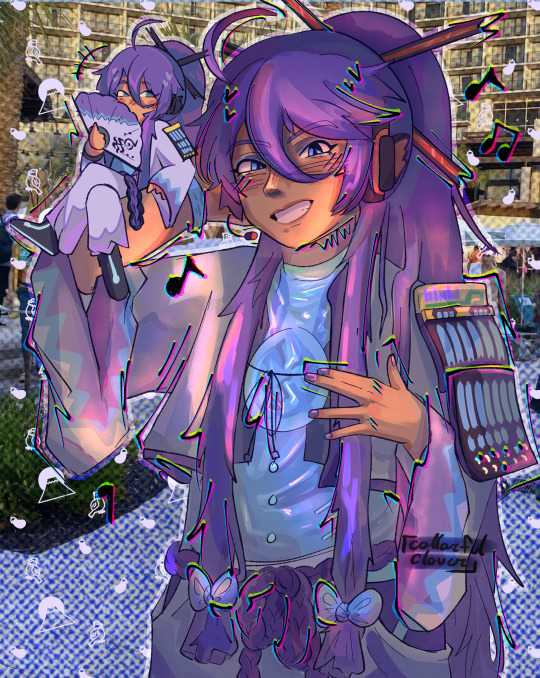
The one samurai dude from vocaloid
#i draw to color things. i love coloring#tagged post#my art#vocaloid#vocaloid fanart#gakupo kamui#kamui gakupo#神威がくぽ#i can never get the kanji for his name I always have to copy paste it from his wiki#fun fact this is actually fanart of one of my super cool cosplayer moots on insta. they're so so cool#their portrayal of this freak is just as chaotic as I imagine him to be. muah#if you take away all the filters I stuck on this would make it the lightest skin tone I've ever drawn him in
403 notes
·
View notes
Text



DANCE!!!!!!
#this took me so long LOL#tbh most of it was bc i couldnt figure out wtf to do with the background#anyway. dancing!! fun!!!! yeah!!!!!!!!!!#teddie#rise kujikawa#yu narukami#yosuke hanamura#kanji tatsumi#naoto shirogane#kanami mashita#nanako dojima#yukiko amagi#chie satonaka#persona#persona 4#persona 4 dancing#p4d#art#my art#xanders art#digital art#fan art
372 notes
·
View notes
Text
Cool Kanji Party Tricks
Or “How I Use Kanji to Impress My Friends”
Learning kanji can be daunting, especially for those just starting out in their Japanese studies. There are two thousand standard kanji needed to read a newspaper, but Japanese people know and use many thousands more. There are several methods available to self study kanji (just do a quick Google search to find the most popular), but any serious study of kanji takes time. Lots of time. It can feel like studying kanji over and over is a waste of time, especially since you have the internet at your fingertips to look things up at any time. However, I really believe that having a good foundation in kanji is essential to mastering Japanese, and I wanted to share what I call "cool party tricks" to encourage you in your kanji studies.
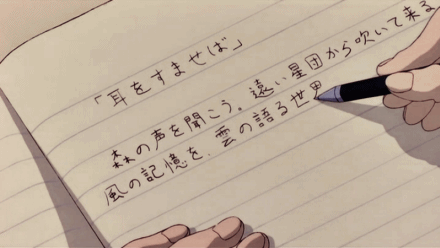
What are "cool kanji party tricks"? This is just a list of things I have noticed that having a solid understanding of kanji will allow you to do. I have been studying Japanese for more than 10 years, and most of these things I just noticed one day in an a-ha moment, and even though someone had told me for years that learning and practicing kanji is important, it took several realizations for me to truly grasp what that meant. I would say that many of these require an intermediate grasp of the language to be able to use consistently, but I think that you can start doing any of these after achieving a basic foundation in the Japanese language.
So when your hand is cramped from writing the same kanji for hours, when on'yomi and kun'yomi have become swear words, and when you lost that one little point on the exam because the kanji you were supposed to use was only off by one stroke from the kanji you actually used... I hope you will remember this post and feel a little bit encouraged.
Find the appropriate kanji to use when typing in the romaji/hiragana on a computer/phone
Since I started my Japanese studies during high school, the formal classes I was taking had me writing out kanji for homework in order to remember it and to be able to pass the quizzes and exams. So I spent many hours writing out kanji only to end up with hand cramps and ugly looking written characters. It took ages and the stream of kanji that I had to learn seemed endless. However, one benefit I quickly saw was that I was able to quickly adapt to typing in Japanese on a computer/phone because I was able to correctly identify the kanji that I had practiced, and knew which one to select when several choices came up.
In Japanese, many words have the same sounds but different kanji and meanings (these are called homophones). So when you type in the hiragana or romaji for a word into the keyboard, it will prompt you with a list of kanji to choose from. Being able to correctly select the right one is something I suddenly realized I could do one day, even if I hadn't used the word often. I knew and could recall a larger number of kanji than I thought, and I could eliminate any incorrect kanji for the word I was trying to use. Having a good solid foundation in kanji characters means that you don't have to go look up every word in the dictionary to check that you have the right kanji, and you also don't have to leave the word in kana because you can't guess the right kanji, but rather you are confident enough to pick the correct kanji for the word on your own. This makes typing more efficient and saves time!
Understand the meaning of a word just by looking at the kanji
When you know a significant amount of kanji and what they mean, sometimes when you encounter new compound words you can guess at what they mean. Or if you are like me and sometimes forget how to read words you are already supposed to know, you can magically relearn them by looking at the kanji and interpreting the meaning. So sometimes when I am reading text in Japanese and I see a compound I don't know, I can interpret the meaning from context and from my understanding of the individual kanji, and continue through the text without stopping to look up the word. This helps you to get the gist of a text without having to look up all the words, and is how you can start reading more advanced books or manga.
Guess at the pronunciation of a word from the kanji
On the flip side of the previous cool party trick is being able to guess how to pronounce a word by knowing the on'yomi and kun'yomi of the kanji, and therefore being able to guess at the pronunciation of a word. Unless the word has 人 or 生 in it. This helps most when reading out loud in class or to another person. It will also help you to feel smug about yourself while reading a book that is of a more advanced level and being able to determine the reading of several compound words in a row.
Understanding a new word using kanji clues
As an extension of the previous cool party tricks, I eventually reached the point where I could hear a word in conversation that I had never heard before, and figure out the meaning using kanji clues.
For example, not all Japanese people know English (shocking, right?), and busting out your phone to look up every single word you don't know can become burdensome in continuing the flow of a conversation. So, if I hear a word that I don't know during a conversation (and the continuation or flow of the conversation hinges on my understanding of the word), I will stop the person and either ask what kanji the word is written with, or if I have a guess I will ask "is this using the kanji for X?" This way I can gain clues to the key word without stopping the flow of conversation too much. (It's also a fun way to show off to Japanese speakers.)
For example, if you hear the word jishin (じしん) in conversation, and you aren't sure which meaning the speaker intended:
自信 self-confidence
自身 one's self
You can ask:
"Did you mean 自信 (jishin) with the "shin" from 信用 (shin'you) or did you mean 自身 (jishin) with the "mi" (another pronunciation of 身) as in one's body?"
Then the person can respond:
"Oh, I mean 身 (mi)! As in, 自分自身 (jibun jishin), or one's self."
Then, you can continue the conversation, having an understanding of what the speaker is saying and not having to take out your phone to translate as often. This also can give the person you are speaking to a better sense of your level and help them to tailor the conversation to you.
[I hope this conveys what I am trying to illustrate ^.^]
TL;DR: Kanji is Fun
Honestly, when kanji clicks and you can read words or understand their meanings, it's like deciphering a secret code, and this is one of the things I find so cool about Japanese, and why I have studied it for so long. So if you are just starting out and are daunted by kanji - don't worry. I am still daunted by kanji, but I also find it a useful tool to improve my knowledge of Japanese and to communicate in a way many people cannot. I hope this information was useful and inspires you to suffer through learn more kanji.
#日本語#japanese#japanese language#japanese langblr#japanese studyblr#langblr#studyblr#learning japanese#learning kanji#cool kanji party tricks#kanji is fun#tokidokitokyo
166 notes
·
View notes
Text
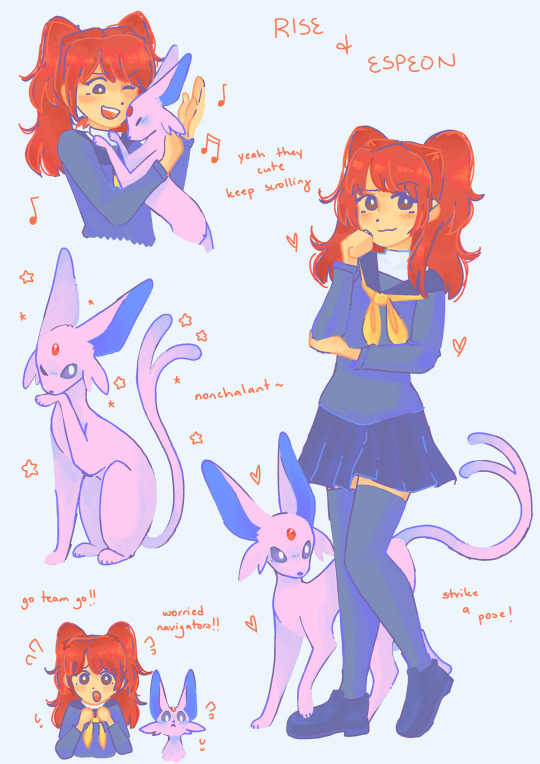
gaslighting gatekeeping girlbosses
#persona 4#p4#rise kujikawa#espeon#pokemon#i feel like espeon matches himiko’s vibes#does that make sense#idk plus espeon is cute and feline and pink#but you can pry kanji + sylveon combo from my cold dead hands#my stuff#rise is soooooo fun to draw i love her hair <3
541 notes
·
View notes
Text



detective princes
(you know the drill. no she/her for naoto.)
#naoto shirogane#goro akechi#persona 5#persona 5 royal#persona 4#I LOVE DRAWING AKECHI. its so fun. his stupid haircut. obsessed.#nuggarts#kanji got the orange tie for naoto BTW...
586 notes
·
View notes
Text
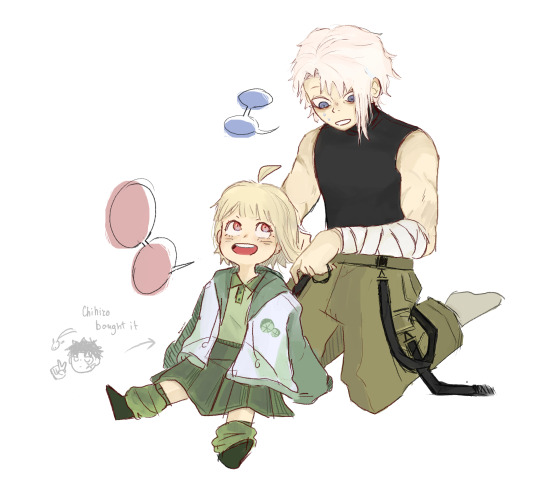
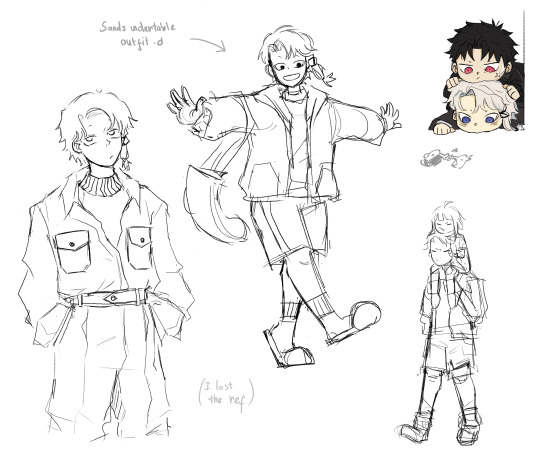


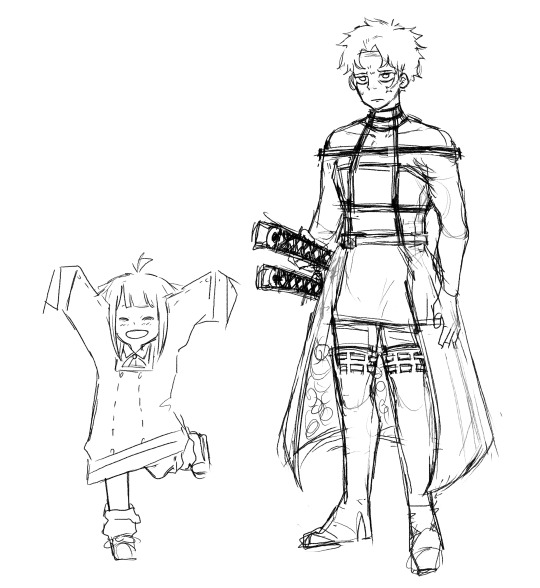
Old ancient unfinished wips yippe. I didn't have the courage to throw em away
SxF x Kgrb crossover AU is slowly consuming my brain I wish I could work faster in digital ToT (I'm so sorry Chihiro)

Btw hater Hakuri is canon now lmaoo
Twt socmed AU was so fun, ya'll should read it too. NOW <- (It's never late)
#Just realized I'm in srs Bachi brainrot#Nad I'd proceed#Dear SxF followers and moots this is your daily reminder to read Bagurakachi 🤙#(I swear I'll comeback)#I need more Char n Hakuri interaction raaaah#Hakuri with Isou kanji is so funny. Why did I do that#currently in artblock#I'm doing anything atp but opening a strawpage lol#Just realized It's mostly Hakuri in the sketches ToT I'm using him as a model he rocks in everything#Also I should draw Shiba and John more. They are fun to draw#Funny how almost everyone accept John as Hishaku leader's name#I love this fandom#ALSO YURI!!!#They never interacted but 10/10 chemistry fr#Hinayuki#Hiyunao#sneak#Shibazami sneak too#Hakuhiro#Chihaku#Chikuri#Kagurabachi#kagurabachi fanart#Kagurabachi art#kagurabachi manga#chihiro rokuhira#char kyonagi#hakuri sazanami#I don't want to ruin others' tags since they appeared a lil#naarinn art
112 notes
·
View notes
Photo


at the beach :p
#i am having a fun art block wish me luck im gonna try to claw my way out#anyway... the kanji for sea in nanamis surname and gojo being symbolized by the sky its canon#i took gojos eye... but i gave him something better... alive nanami#jjk spoilers#jjk manga spoilers#if you squint...#its mostly my au where nanami lives and gojo loses an eye in the battle w sukuna#my art#nanago#nanami kento#kento nanami#gojo satoru#satoru gojo#gonana#jjk#jujutsu kaisen#jjk fanart
837 notes
·
View notes
Text
Kanji for “tear”, “tears”
涙 = rui / namida
血も涙もない - chimonamidamonai - cold-blooded/ cold-hearted - ちもなみだもない
涙 - namida - a tear/ sympathy - なみだ
催涙ガス - sairuigasu - tear gas - さいるいガス
涙ぐむ - namidagumu - to be nearly in tears / to be moved to tears - なみだぐむ
涙を流す - namida (w)o nagasu - to cry / to shed tears / to weep - なみだ を ながす
感涙 - kanrui - (shed) tears of gratitude - かんるい
94 notes
·
View notes
Text
thinking about haku as usual and his name (草薙 伯玖) and how much it tells us about his character -
草薙 (kusanagi)
according to an old myth (from kojiki), kusanagi-no-tsurugi is a sword pulled from the body of a serpent. it allows the user to control the wind. today, it is still used during modern enthronement ceremonies of the japanese emperor, but due to its status as a 'divine object' nobody is actually allowed to see it...? (source)
haku being named after a sword is really interesting because it introduces the idea of him being a weapon... by whom is he wielded?
this might just be a reference to how haku's family comes from a line of priests, but the idea of this being a 'divine' sword / being something nobody is allowed to see also hints at how maybe nobody knows the real haku, or nobody knows his real intentions.
that being said, separately, the characters mean 'grass' (草) and 'to cut / remove' (薙) - the image of clearing grass does point towards something more like revealing the truth... perhaps this is what he is meant to do in the future?
the fact that the sword came from the body of a slain serpent is also interesting! there's an argument made by the earlier source that "the sword found within the serpent shows its identity with the serpent by its very designation" - i.e. he is the snake. it tracks with his character design (narrower yellow pupils)!
also grass might explain his hair lol
伯 (haku)
older / protective / respected male figure
this makes sense, since haku is the one to bring mc to darkwick and more or less is the one looking out for them / gives them advice etc.
玖 (ku)
nine / type of jade
probably to balance out the rest of the name?
when looking at his 五格 and 五行 (name-based divination), it's a mixed bag, but there are two numbers that stand out:
his 天格 reads that he's loyal, chivalrous, brave, realistic and sticks to his morals im a haku simp
but his 人格 reads that as he grows older, his life might have constant turmoil, leading him to rebelliousness, indulgence, and a short-lived life / losing loved ones at a young age. his number is often associated with "misfortune of a hero who is not a hero".
overall i think his name really fits with what we know about his character so far & his character design!! it gives us a hint of what might come for him in the future too!! the writers rly popped off with him
#there are other characters that are also perfectly named#based on their kanji alone#maybe ill deep dive one day 0:#tokyo debunker#lin yapping#haku kusanagi#fun fact also#his 'wood' score on the 五格 is the highest#which also tracks with how his fighting in the arena is leaf??? type??#name series#haku brainrot
58 notes
·
View notes
Text
Really love Mochi and Mitsuya's insulting compliments they give to each other. It's like they hate each other as enemies but there's this sort of mutual respect for each others strength. Generally think they were both having fun with this fight.


#it's just a fun dynamic#tokyo revengers#tokrev#tokyo rev#mitsuya takashi#kanji mochizuki#tokyo revengers spoilers
177 notes
·
View notes
Text

:) Every :) days :) great :) at :) your :) Junes :)
#IM BACK LMFAO#soz its been so long being home from uni has not been fun…#but i played p3/4 whilst i was out so ive got some scan lined up x#persona 4#persona 4 fanart#yu narukami#souji seta#yosuke hanamura#chie satanoka#yukiko amagi#kanji tatsumi#rise kujikawa#naoto shirogane#no teddie cause i dont like him x
259 notes
·
View notes
Text
This was Kanji during the time skip trust me I'm John Atlus


#soukan#kanji tatsumi#yu narukami#yu narucookie......#persona 4#i did this while my eyes were dilated and everything was blurry. very fun.#ignore that i forgot the thumbs
24 notes
·
View notes
Text




This started as just the first page and then I coulsn't stop doodling him so here we have. four pages of Sho doodles & headcanons
#in my head he hangs out w/ the p4 gang post-game and also minazuki is back bc i miss him. and im sure sho does too#hes so fun to draw#sho minazuki#kanji tatsumi#teddie#yosuke hanamura#chie satonaka#yu narukami#naoto shirogane#rise kujikawa#yukiko amagi#nanako dojima#ryotaro dojima#persona#persona 4#persona 4 arena#persona 4 arena ultimax#p4#p4a#p4au#art#my art#xanders art#digital art#fan art
208 notes
·
View notes
Text


I made @boigameista ‘s frog pattern! This was the first thing ive ever sown and it turned out better than i thought it would! Then my dad wanted to show me his nametag stamping set so i finegled a 1 and an l stamp to make the kanji for frog! Say hi to kaeru!
#this was a lot of fun to make im real proud of myself :3#the kanji looks ehh but its also my first and only try and its still somewhat legible so i take it was a win!
25 notes
·
View notes